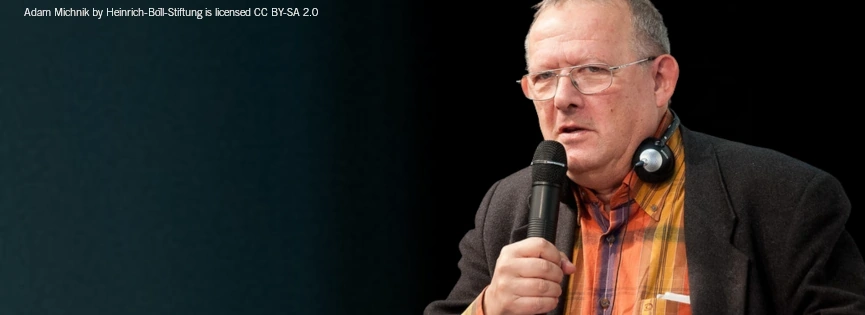You are in:
Laureates
Start of main content
Adam Michnik
Princess of Asturias Award for Communication and Humanities 2022

Brimming with emotion, I humbly wish to express my gratitude to the Jury for this extraordinary award.
I also wish to extend my sincerest congratulations to all the Laureates.
For me –as for many other Poles–, Spain has been a model to follow. Spain’s experience showed us how to confront the dictatorship and seek a path to democracy via dialogue and consensus. Getting the force of arguments to replace the argument of force was what was needed.
After all, this magnificent Princess of Asturias Award is not for me, but for Gazeta Wyborcza, the newspaper that came into being at the same time as Polish democracy, in 1989.
From the outset, Gazeta Wyborcza strove to be part of this democracy.
Personally, I owe a great deal to the experience and advice of my friends in the editorial office of the El País newspaper, which played such an important role in shaping Spanish democracy.
Throughout all these years, we have sought to defend two essential values of democracy: freedom and truth.
Today, these values are once again threatened by the criminal aggression carried out by Putin’s regime against Ukraine.
The war that Putin’s regime has unleashed against Ukraine is actually a war against the democratic world as a whole.
Every day we are faced with horrific images of looting, rape, torture and murder perpetrated by Putin’s army in Ukraine.
But Putin is not Russia. That is why we wish to recognize those Russians who oppose this barbarity of war and openly express their opposition. They are the ones who defend Russia’s honour, as Sakharov and Solzhenitsyn did in their day; as Thomas Mann defended Germany’s honour during the years of the Nazi apocalypse.
We must respect them for it.
This is an evil war unleashed by evil men who, possessed by the madness of the imperialism of Great Russia, remind us today of what men are capable of when poisoned by the mixture of Nazism and Bolshevism, and by their cruelty and anarchy.
Putin cannot win this war. Helping Ukraine in its struggle is the duty of all democrats in the world, while the solidarity with Ukraine of democrats from so many countries inspires admiration and hope.
However, we can also see worrying signs in Europe and the United States.
A trend is gaining ground in public life that resorts to the language and practice of aggressive populism, nationalism and authoritarianism.
It is the practice of contempt expressed in the language of the totalitarian left and right. One waves black flags, the other red.
Still, as one Polish poet wrote, “Fascists often change shirts.”
What both have in common is contempt for what is most valuable in European tradition: mercy, childhood, Christian tradition and the reason of the descendants of the Age of Enlightenment.
Instead of democracy, these heirs to totalitarian traditions promise an absurd vision of an ethnically pure or perfectly egalitarian world.
But we remember that only the concentration camps were ethnically pure and imbued with perfect equality.
In his book dedicated to Cervantes’ masterpiece, Don Quixote, the great Spanish writer and philosopher Miguel de Unamuno wrote,
“And it was to no avail that Master Peter pointed out to Don Quixote that the people he overthrew, destroyed, and murdered were not true Moors, but merely pasteboard figures, for the Knight did not abate his swipes and thrusts. And he did well, but very well. The Masters Peters of the world set up their folderol of puppets, and they expect that, because the figures are made of pasteboard and declared to be such, you will respect them. But what the knight-errant must overthrow, decapitate, and maim is precisely that which, under the title of fiction, does more harm than error itself. For error believed is more respectable than truth disbelieved.”
The Princess of Asturias Award is proof that it is worth upholding freedom, decency and the right to make mistakes when seeking out the truth.
End of main content
Sección de utilidades
Fin de la sección de utilidades
- Legal document Legal document (Access key 8)
- | Privacy policy Privacy policy (Access key )
- | Social networks ???en.portal.pie.menu107.title???
- | Cookies ???en.portal.pie.menu110.title???
- | Site map Site Map (Access key 3)
- | Contact Contact (Access key )
- | XHTML 1.0
- | CSS 2.1
- | WAI 'AA
© Copyright 2024. FUNDACIÓN PRINCESA DE ASTURIAS
 Minutes
of the jury
Minutes
of the jury


